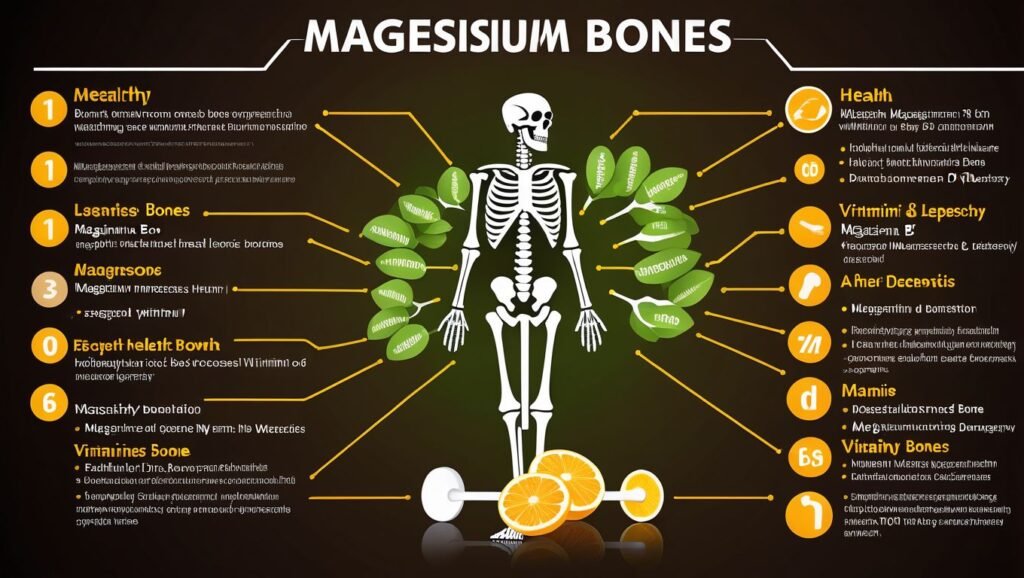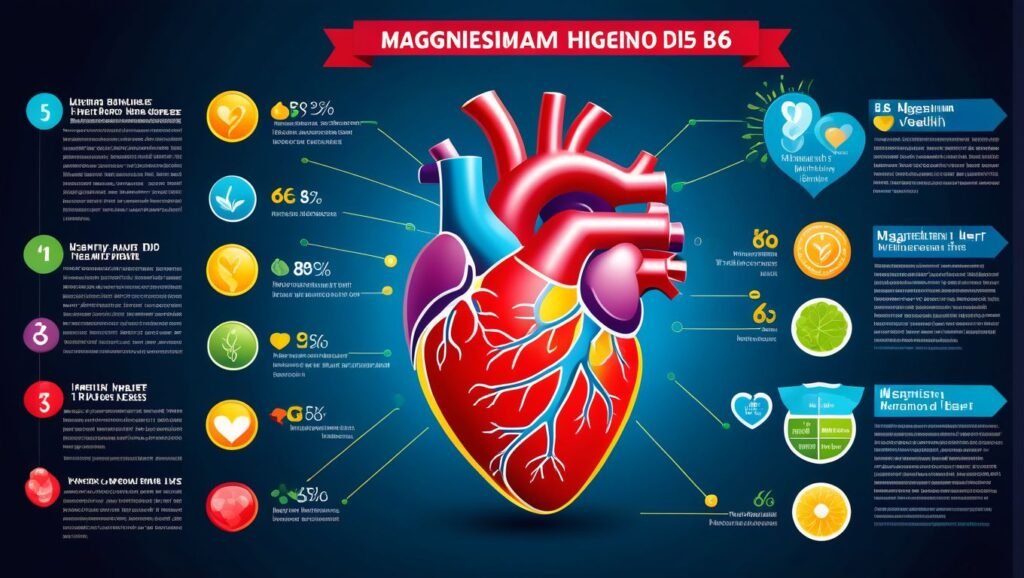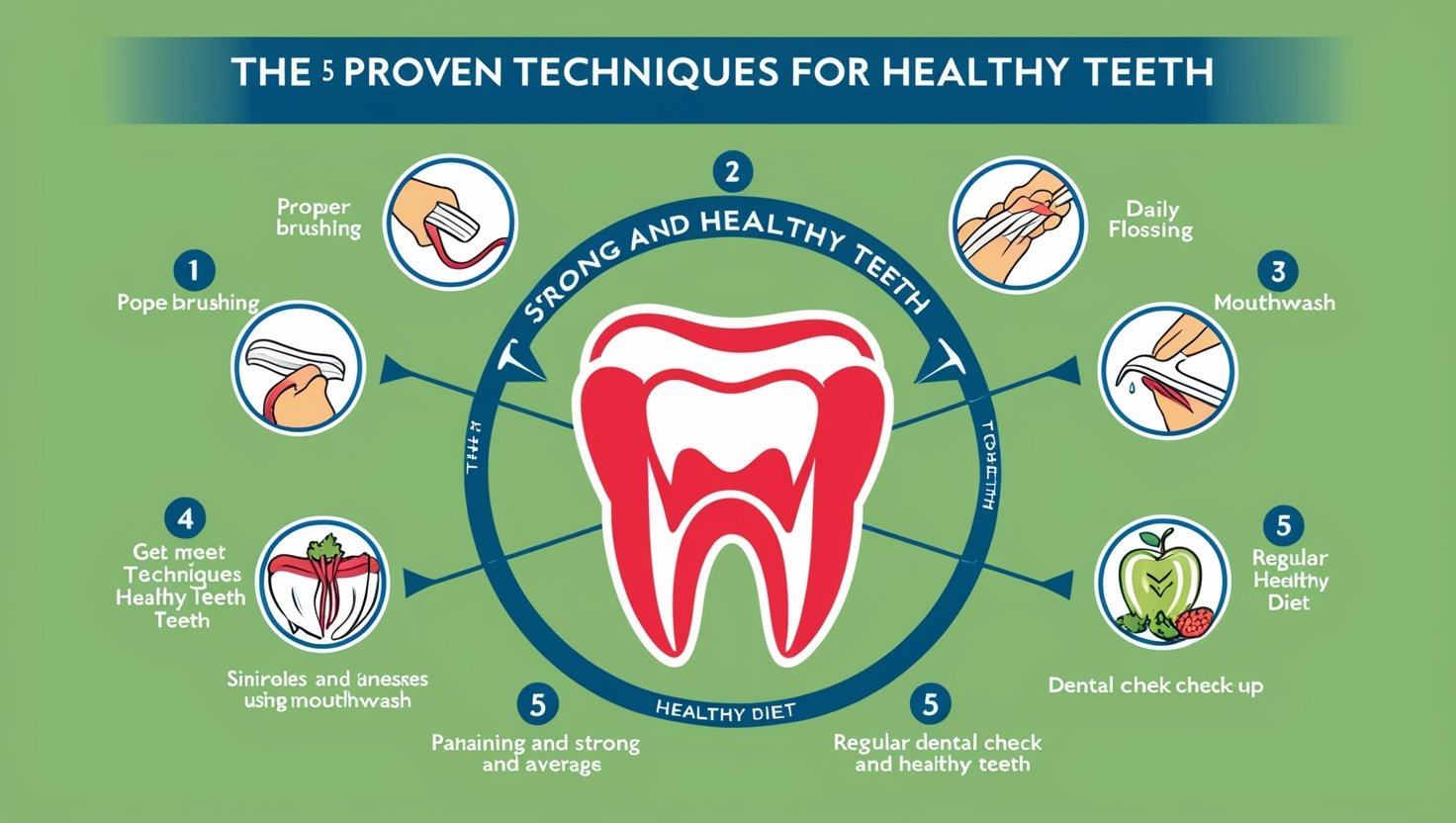
“10 Essential Health Boosts from Magnesium + Vitamins”
10 Health Boosts from Magnesium and Vitamins You Need
Discover 10 essential health boosts from magnesium and vitamins to enhance your well-being and vitality effectively.

Introduction
Brief Overview of Magnesium, Vitamin D, and Vitamin B6
Magnesium, Vitamin D, and Vitamin B6 are essential nutrients that play crucial roles in maintaining overall health. Magnesium is a mineral involved in over 300 biochemical reactions in the body, including muscle and nerve function, blood glucose control, and bone health.
Vitamin D is a fat-soluble vitamin that helps the body absorb calcium, supports bone health, and modulates immune function. Vitamin B6, also known as pyridoxine, is a water-soluble vitamin that is important for brain development, immune function, and the production of neurotransmitters.
Explanation of Their Combined Health Benefits
When combined, magnesium, vitamin D, and vitamin B6 offer synergistic health benefits that enhance overall well-being. Magnesium and Vitamin D work together to support bone health and calcium absorption, while Vitamin B6 plays a role in energy metabolism and neurotransmitter synthesis.
Together, these nutrients support immune function, cardiovascular health, cognitive function, and more. Ensuring adequate intake of magnesium, vitamin D, and vitamin B6 can help maintain optimal health and prevent various deficiencies and related health issues.

Benefit 1: Immune Support
Role of Magnesium, Vitamin D, and Vitamin B6 in Boosting the Immune System
Magnesium, Vitamin D, and Vitamin B6 are crucial for a robust immune system. Magnesium is involved in the activation of immune cells and the regulation of inflammatory responses.
Vitamin D modulates the immune system by enhancing the pathogen-fighting effects of monocytes and macrophages and reducing inflammation. Vitamin B6 is essential for the production of antibodies and the proper functioning of lymphocytes, which are critical for immune response.
Their Combination Enhances Immune Function
The combination of magnesium, vitamin D, and vitamin B6 enhances immune function by providing comprehensive support to the body’s defense mechanisms. Magnesium helps regulate immune cell activity and inflammatory responses, ensuring a balanced immune response.
Vitamin D enhances the pathogen-fighting capabilities of immune cells and reduces chronic inflammation. Vitamin B6 supports the production of antibodies and the function of lymphocytes, ensuring an effective immune response. Together, these nutrients help the body fight off infections, reduce inflammation, and maintain overall immune health.

Benefit 2: Bone Health
The importance of Magnesium, Vitamin D, and Vitamin B6 for Bone Health
Magnesium, Vitamin D, and Vitamin B6 are essential for maintaining strong and healthy bones. Magnesium is a key component of bone tissue and is involved in the regulation of calcium and vitamin D metabolism.
Vitamin D is crucial for calcium absorption and bone mineralization, ensuring that bones remain strong and healthy. Vitamin B6 supports bone health by regulating homocysteine levels, an amino acid that, when elevated, is associated with an increased risk of bone fractures.
How Their Combination Supports Bone Density and Strength
The combination of magnesium, vitamin D, and vitamin B6 provides comprehensive support for bone health. Magnesium and Vitamin D work together to enhance calcium absorption and bone mineralization, ensuring that bones remain strong and dense. Vitamin B6 helps regulate homocysteine levels, reducing the risk of bone fractures and supporting overall bone health. By ensuring adequate intake of these nutrients, individuals can support bone density, reduce the risk of osteoporosis, and maintain strong, healthy bones.

Benefit 3: Heart Health
Role of Magnesium, Vitamin D, and Vitamin B6 in Maintaining Cardiovascular Health
Magnesium, Vitamin D, and Vitamin B6 are essential for maintaining cardiovascular health. Magnesium helps regulate heart rhythm, blood pressure, and vascular tone, reducing the risk of cardiovascular diseases. Vitamin D supports cardiovascular health by reducing inflammation, improving endothelial function, and regulating blood pressure. Vitamin B6 is involved in the metabolism of homocysteine, an amino acid that, when elevated, is associated with an increased risk of heart disease.
How Their Combination Reduces the Risk of Heart Disease
The combination of magnesium, vitamin D, and vitamin B6 provides comprehensive support for cardiovascular health. Magnesium helps maintain a healthy heart rhythm and blood pressure, reducing the risk of heart disease.
Vitamin D reduces inflammation and improves endothelial function, supporting overall cardiovascular health. Vitamin B6 helps regulate homocysteine levels, reducing the risk of atherosclerosis and heart disease. By ensuring adequate intake of these nutrients, individuals can support heart health, reduce the risk of cardiovascular diseases, and promote overall well-being.
Benefit 4: Cognitive Function
How Magnesium, Vitamin D, and Vitamin B6 Support Brain Health
Magnesium, Vitamin D, and Vitamin B6 play crucial roles in maintaining brain health and cognitive function. Magnesium is involved in neurotransmitter function, synaptic plasticity, and brain energy metabolism.
Vitamin D supports brain health by regulating the production of neurotrophic factors, which promote the growth and survival of neurons. Vitamin B6 is essential for the synthesis of neurotransmitters, such as serotonin, dopamine, and gamma-aminobutyric acid (GABA), which are critical for mood regulation and cognitive function.
Benefits for Memory, Mental Clarity, and Cognitive Function
Adequate intake of magnesium, vitamin D, and vitamin B6 is associated with improved memory, mental clarity, and cognitive function. Magnesium’s role in neurotransmitter function and synaptic plasticity helps enhance learning and memory.
Vitamin D’s regulation of neurotrophic factors supports neurological health and cognitive function. Vitamin B6’s involvement in neurotransmitter synthesis helps regulate mood and cognitive processes. Together, these nutrients help maintain brain health, improve cognitive performance, and reduce the risk of neurodegenerative diseases.
Benefit 5: Energy Metabolism
How Vitamin B6 Supports Energy Metabolism
Vitamin B6, also known as pyridoxine, plays a crucial role in energy metabolism by helping the body convert food into energy. It acts as a catalyst in various metabolic pathways, including the metabolism of carbohydrates, proteins, and fats.
Vitamin B6 is essential for the synthesis of neurotransmitters, such as serotonin and dopamine, which are involved in regulating mood and energy levels. Adequate intake of Vitamin B6 ensures that the body efficiently produces and utilizes energy, preventing fatigue and supporting overall vitality.
Role of Magnesium and Vitamin D in Maintaining Energy Levels
Magnesium and Vitamin D also play important roles in maintaining energy levels. Magnesium is involved in the production of ATP (adenosine triphosphate), the primary energy currency of the cell.
It helps activate enzymes that are necessary for energy production and supports muscle and nerve function. Vitamin D supports energy metabolism by enhancing the absorption of calcium and phosphorus, which are essential for muscle contraction and energy production.
Together, magnesium, vitamin D, and vitamin B6 help maintain optimal energy levels and prevent fatigue.
Benefit 6: Anti-Inflammatory Effects
Anti-Inflammatory Properties of Magnesium, Vitamin D, and Vitamin B6
Magnesium, Vitamin D, and Vitamin B6 have potent anti-inflammatory properties that help reduce inflammation in the body. Magnesium helps regulate the production of inflammatory cytokines, which are signaling molecules that mediate the inflammatory response. Vitamin D modulates the immune system by reducing the production of pro-inflammatory cytokines and enhancing the production of anti-inflammatory cytokines. Vitamin B6 is involved in the synthesis of anti-inflammatory molecules and helps regulate immune function.
How Their Combination Helps Manage Chronic Inflammatory Conditions
The combination of magnesium, vitamin D, and vitamin B6 helps manage chronic inflammatory conditions by providing comprehensive anti-inflammatory support. Magnesium and Vitamin D work together to reduce oxidative stress and inflammation, protecting cells and tissues from damage.
Vitamin B6 supports the production of anti-inflammatory molecules and regulates immune function, helping to reduce chronic inflammation. By ensuring adequate intake of these nutrients, individuals can manage chronic inflammatory conditions, such as arthritis, inflammatory bowel disease, and autoimmune disorders, and improve their overall health.
Benefit 7: Muscle Function
The importance of Magnesium, Vitamin D, and Vitamin B6 for Muscle Health
Magnesium, Vitamin D, and Vitamin B6 are essential for maintaining healthy muscle function. Magnesium is involved in muscle contraction and relaxation, and it helps prevent muscle cramps and spasms.
Vitamin D supports muscle health by enhancing calcium absorption, which is necessary for muscle contraction. Vitamin B6 plays a role in protein metabolism and the synthesis of neurotransmitters, which are essential for muscle function and coordination.
How Their Combination Supports Muscle Function and Reduces Cramps
The combination of magnesium, vitamin D, and vitamin B6 provides comprehensive support for muscle health. Magnesium helps regulate muscle contraction and relaxation, preventing cramps and spasms. Vitamin D enhances calcium absorption, ensuring that muscles have the necessary nutrients for proper function.
Vitamin B6 supports protein metabolism and neurotransmitter synthesis, promoting muscle coordination and reducing the risk of muscle cramps. By ensuring adequate intake of these nutrients, individuals can support muscle function, reduce cramps, and maintain overall muscle health.
Benefit 8: Mood Regulation
Role of Magnesium, Vitamin D, and Vitamin B6 in Mood Regulation
Magnesium, Vitamin D, and Vitamin B6 play crucial roles in regulating mood and mental health. Magnesium is involved in the production of neurotransmitters, such as serotonin and dopamine, which are essential for mood regulation.
Vitamin D supports brain health by regulating the production of neurotrophic factors, which promote the growth and survival of neurons. Vitamin B6 is essential for the synthesis of neurotransmitters, such as serotonin, dopamine, and gamma-aminobutyric acid (GABA), which are critical for mood regulation and cognitive function.
How Their Combination Helps Reduce Symptoms of Depression and Anxiety
The combination of magnesium, vitamin D, and vitamin B6 helps reduce symptoms of depression and anxiety by providing comprehensive support for brain health and neurotransmitter function.
Magnesium’s role in neurotransmitter production helps enhance mood and reduce anxiety. Vitamin D’s regulation of neurotrophic factors supports neuronal health and cognitive function, reducing the risk of depression.
Vitamin B6’s involvement in neurotransmitter synthesis helps regulate mood and cognitive processes, reducing symptoms of depression and anxiety. Together, these nutrients help maintain mental health and improve overall well-being.
Benefit 9: Skin Health
Importance of Magnesium, Vitamin D, and Vitamin B6 for Healthy Skin
Magnesium, Vitamin D, and Vitamin B6 are essential for maintaining healthy skin. Magnesium acts as an antioxidant, protecting skin cells from oxidative damage caused by free radicals. Vitamin D supports skin health by regulating cell growth and repair, and it helps protect against skin infections. Vitamin B6 plays a role in protein metabolism and the synthesis of collagen, which is essential for maintaining skin elasticity and preventing wrinkles.
Their Combination Protects Against Skin Damage and Aging
The combination of magnesium, vitamin D, and vitamin B6 provides comprehensive protection against skin damage and aging. Magnesium and Vitamin D work together to reduce oxidative stress and inflammation, protecting skin cells from damage. Vitamin B6 supports collagen synthesis and protein metabolism, promoting skin elasticity and reducing the appearance of wrinkles. By ensuring adequate intake of these nutrients, individuals can maintain healthy, youthful-looking skin and protect against skin damage and aging.
Conclusion
Recap of the 10 Health Benefits of Magnesium, Vitamin D, and Vitamin B6
Magnesium, Vitamin D, and Vitamin B6 offer numerous health benefits, including immune support, bone health, heart health, cognitive function, energy metabolism, anti-inflammatory effects, muscle function, mood regulation, and skin health. Their combined effects provide comprehensive support for overall well-being and help reduce the risk of chronic diseases.
Encouragement to Include These Nutrients in Your Diet for Overall Well-Being
Incorporating magnesium, vitamin D, and vitamin B6 into your diet is an effective way to ensure you get enough of these essential nutrients. By doing so, you can support your immune system, protect against oxidative damage, maintain cardiovascular and cognitive health, reduce inflammation, and promote healthy skin, muscles, and mood. Remember to consult with a healthcare provider before starting any new supplement regimen to ensure it is appropriate for your individual needs.





One Comment
Pingback: